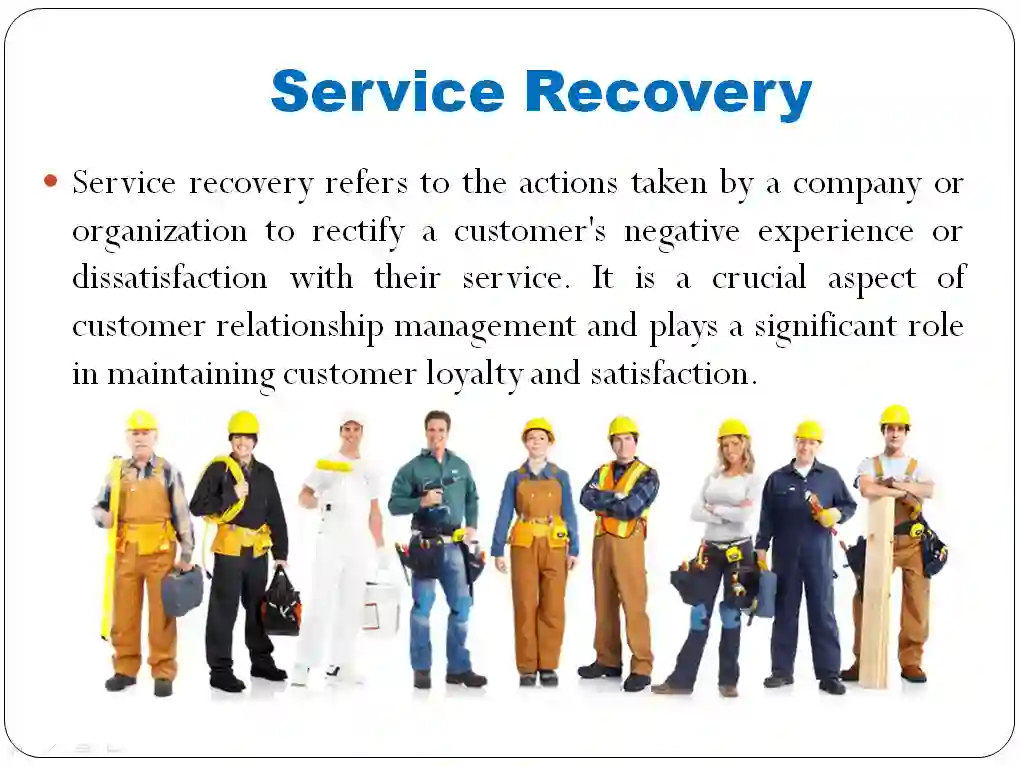Table of Contents:-
Service Recovery Meaning
Service recovery refers to the measures taken by an organisation in response to a service failure. It is a planned process or strategy of returning an aggrieved or dissatisfied client to a state of satisfaction with the company.
Research has shown that customers who have had service failures exhibit higher levels of brand loyalty towards a company compared to those who have never encountered such issues. Service Recovery practices are a necessary element in a Customer Loyalty Program. The key value to effective service recovery and complaint handling: is customer retention.
Viewed as a proactive and effective strategy, service recovery efficiently addresses customer complaints. Complaint handling has severe negative connotations; whereas service recovery has positive connotations, Complaint handling placates people, minimising a negative. Service recovery practices are essential for unlocking the untapped potential and latent value that customers hold for a company.
The ultimate aim of service recovery is to correct the current poor situation and take the client from dissatisfied to satisfied. The process of service recovery should not be haphazard; instead, it requires careful planning and control. Organisations, therefore, must embed a service recovery management system into their cultural context that champions the perspective that errors are inevitable but dissatisfied customers are not.
A successful service recovery management requires top management commitment to integration around “service logic,” fitted to shared values and strategy, as reinforced by the seamless collection and sharing of information and recovery metrics and rewards. This integration can result in the implementation of best practices in service recovery management. Extensive research indicates that such practices will lead to higher customer satisfaction, higher customer loyalty, and higher profitability.
Related Articles:
- nature of business meaning
- nature of international business
- scope of international marketing
- determinants of economic development
- nature of capital budgeting
- nature of international marketing
Principles of an Effective Service Recovery System
The principles of an effective service recovery system are described below:
1) Facilitate the Feedback Process for Customers
How can managers overcome the reluctance of unhappy customers to complain about service failures? The most effective approach is to address the reasons for their reluctance directly. Many companies have improved their complaint collection procedures by adding special toll-free phone lines, links on their websites, prominently displayed customer comment cards in their branches, or even providing video terminals for recording complaints. In their customer newsletters, some companies feature service improvements that were the direct result of customer feedback under the title, “You told us and we responded”.
2) Enable Effective Service Recovery
Recovering from service failures takes more than just pious expressions of determination to fix any problems that may emerge. It requires planning, commitment, and clear guidelines.
These points are described in detail as follows:
i) Service Recovery should be Proactive
Service recovery needs to be initiated on the site ideally before customers have a chance to complain. Service personnel should be sensitised to signs of customer dissatisfaction and ask whether customers might be experiencing a problem. For example, the waiter may ask a guest who has consumed only half of their dinner, “Is everything satisfactory, Sir?” The guest might say, “Yes, thank you, I’m not very hungry,” or “The steak is well done but I asked for medium-rare, plus it was very salty.” The latter response gives the waiter a chance to recover the service, rather than have an unhappy diner leave the restaurant and potentially not return.
ii) Recovery Procedures Need to be Planned
It’s crucial to develop contingency plans for service failures, particularly for those that might happen regularly and cannot be removed from the system’s design. Revenue management practices in the travel and hospitality industries often result in overbooking, and travellers are denied boarding or hotel guests are allowed even though they have confirmed seats or reservations. To simplify the tasks of front-line staff, firms should identify the most common service problems, such as overbooking, and develop predetermined explanation sets for employees to follow.
iii) Recovery Skills must be Taught
As a customer, you may experience a sense of insecurity when faced with service failure, as it deviates from your initial expectations. When seeking assistance, you turn to an employee. However, are they both willing and capable of assisting you? Effective training is a crucial element in fostering confidence and competence among front-line staff, enabling them to turn distress into delight.
iv) Recovery Requires Empowered Employees
Service recovery efforts should be flexible and employees should be empowered to use their judgement and communication skills to develop suitable solutions that will ultimately satisfy dissatisfied customers. This is especially true for out-of-the-ordinary failures for which a firm may not have developed and trained potential solution sets. Employees need to have the authority to make decisions and spend money to resolve service problems promptly and recover customer goodwill.
v) Anticipate the Need for Recovery
Whenever rolling out a product or service, the people related to it are probably well aware of potential problems or obstacles that might occur. It is probably not so much arrogance than probably more wishful thinking that often hinders companies from accurately anticipating potential issues with their products. Accepting that even the best-designed product or service will fail one day in typical situations is the first step.
Anticipating potential problems will help organisations to be prepared when the first customer contacts the company with a problem. For example, when a waiter approaches a guest who has only consumed half of their dinner, “Is everything all right, sir?” In response, the guest may say, “Yes, thank you, I am not very hungry”, or “The steak is well cooked, but I had asked for medium rare, plus it is very salty”. The latter response then gives the waiter a chance to recover the service, rather than have an unhappy dinner leave the restaurant and potentially not return.
vi) Build an Organisation that is Fast in Decision-Making and Fast to Respond
One of the key success factors in winning back customers and restoring their satisfaction is acting promptly. While the front-line employees might be working hard (and fast) already, the whole organisation that deals with service recovery has to be “designed for agility”. This entails establishing well-defined escalation and decision-making processes. One key principle should be that the fastest decision making occurs when front-line employees are empowered to make decisions. So, the real goal is not to define better escalation processes but to define processes that empower employees, rendering escalation processes unnecessary.
vii) Train Employees
Ensure that the training program includes not just lessons on delivering service when everything works out as planned but also lessons that teach employees to improvise or to set recovery programs into action if something goes wrong. While these strategic initiatives are important to define the long-term direction of the service recovery programs, the “moment of truth” happens when a customer contacts a company and interacts with an employee to discuss the problems and possible solutions.
3) How Generous should Compensation be
Different recovery strategies incur significantly varying costs. What is the appropriate level of compensation that a company should provide in the event of a service failure? Or will an apology be sufficient? Managers can rely on the following rules of thumb to effectively address these questions:
i) What is the Positioning of our Firm
If a company is renowned for its exceptional service and charges a premium for its high long-term customers and those who spend heavily at a service provider expect more, it is worth making efforts to save their business, and quality offerings, customers will expect service failures to be rare, so the firm should make a demonstrable effort to recover the few failures that do occur and be well-prepared to provide something of substantial value as a means of compensation. In a more affordable, mainstream business, customers are likely to consider something quite modest, such as a free coffee or dessert, as fair compensation.
ii) How Severe was the Service Failure
“The general guideline is to ‘let the punishment fit the crime’. Customers expect little for minor inconveniences, but much more significant compensation if major damage in terms of time, effort, annoyance, or anxiety, was created by the failure.
iii) Who is the Affected Customer
Customers who have been with a service provider for a long time, as well as those who spend heavily on the service provider, have high expectations and it is worth the effort to save their business. One-time customers tend to be less demanding and have less economic importance to the company. Hence, compensation can be less but should still be adequate. Treating first-time users well can potentially convert them into repeat customers. The overall rule of thumb for compensation for service failures is to exercise a judicious level of generosity. Being perceived as stingy adds insult to injury, and the firm would probably be better off simply apologizing than offering only minimal compensation.
Excessive and lavish compensation is not only expensive, but customers may even interpret such a response negatively, raising questions in their minds about the soundness of the business and fostering suspicion about its underlying motives. Customers may worry about the implications for the employee and the business. Also, over-generosity does not seem to result in higher repeat purchase rates than simply offering fair compensation. There is a risk, too, that a reputation for over-generosity may encourage dishonest Jay customers to deliberately seek out instances of service failures.

You May Also Like:-
Theories of International Trade
International Human Resource Management
International Financial System
International Commodity Agreements
United Nations Conference on Trade and Development
International Trading Environment
Scope of International Marketing
Determinants of Economic Development
Impact of Globalisation on International Business
International Business Environment
Complexities of International Business
Difference between Domestic and International Business
Importance of International Business
Modes of Entry into International Business
Factors Affecting International Business
Major Reasons for International Business
